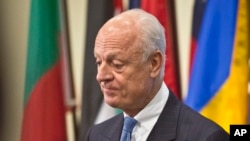The U.N. envoy on the Syrian crisis said Thursday that he is proposing “freeze zones” where fighting would stop in a bid to ease the suffering of millions of Syrians caught among their government, opposition groups and Islamic State fighters.
Staffan de Mistura has spent the last 40 days traveling in the Middle East and beyond to meet key stakeholders in the Syrian conflict, which is slipping into its fourth year with no political solution in sight. Fighting has left more than 200,000 people dead and millions more displaced and as refugees.
De Mistura came to the U.N. Security Council to brief members on his consultations and how he plans to approach a crisis that frustrated his two predecessors - former U.N. chief Kofi Annan and veteran Algerian diplomat Lakhdar Brahimi.
De Mistura told reporters after closed door talks that he does not have a peace plan at this stage, but rather an “action plan.”
“Take this horrific, horrible trigger that Da’esh/ISIS has been producing in everyone - in the region and in Syria - as a trigger for actually moving forward for what could be some actions on the ground for those who agree that terrorism, which is Da’esh, is to be stopped," said De Mistura.
Da’esh and ISIS are two of the acronyms that the so-called Islamic State is known by. The group, which has gained a reputation for its brutal tactics, including beheadings, has seized parts of eastern Syria and western Iraq for its intended caliphate. A U.S.-led coalition of countries has been conducting airstrikes targeting the group in both countries since late September.
Envoy de Mistura said his plan is different than local cease-fires, which have previously failed in Syria.
“It should be something that freezes the conflict in that area and gives an opportunity for some type of humanitarian improvement and for the people to feel that at least there, there will not be this type of conflict," he said.
De Mistura was vague on how his initiative would work, but said that the northwestern city of Aleppo would be a good candidate, as its residents have been under constant pressure from both the government and fighters.
Syria's U.N. envoy said De Mistura would be able to discuss the proposal with officials in Damascus.
Also briefing the council Thursday was the U.N.’s deputy humanitarian chief, Kyung-wha Kang. Speaking via a video link from Geneva, she said the U.N. and its partner agencies are still unable to deliver sufficient quantities of aid to Syrians in the hardest to reach areas. This includes some 600,000 people in areas controlled by Islamic State fighters, 200,000 in government-controlled areas and 45,000 in areas controlled by opposition armed groups.
Kang warned that there is a severe shortage of funding for aid efforts. An appeal for $2.3 billion is less than 40 percent funded and means if money is not received quickly, food assistance to over 4 million Syrians will be reduced and 1 million others will not receive blankets, fuel, and warm clothes ahead of winter.




